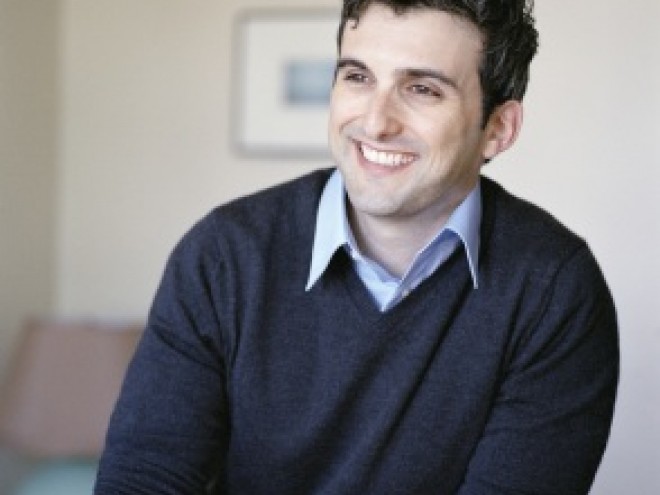In this marvelous debut collection, Nadler gives us seven stories replete with memorable characters and expertly crafted plots. The tales — most of which take place in New England and are told by inviting first-person narrators — offer poignant portraits of men and women dealing with loss, loneliness, family rivalries, and the joys and pangs of lovesickness. The title story, for instance, a piece that evokes the dramatic tension of Malamud’s short fiction, presents an aging family man trying desperately to hide his affair with his longtime business partner’s twenty-something daughter. In “Our Portion, Our Rock,” we find a lawyer on his thirtieth birthday, forced to balance the stress of caring for his dying father with the rest of his life; the story is told with tenderness and pitch-perfect dialogue, and resolves in a stunning final few pages. “Beyond Any Blessing” follows Daniel — orphaned at a young age and raised by his rabbi grandfather — in his attempt to intervene after learning that his grandfather is being forced out of the synagogue. Typical of Nadler’s other stories, Daniel recalls his childhood and adolescence with raw candor; and the scenes involving Daniel’s adolescent love interest, Shari, who is still a part of his life, simply shine. Throughout, Nadler writes of Jewish characters, who, often burdened by guilt, doubt, regret or some combination thereof, navigate their lives with an acute and complex sense of personal history. With this collection, Nadler firmly establishes himself within the tradition of short story writers such as John Cheever and Richard Ford, and announces himself as a promising voice in contemporary fiction.
Meet Sami Rohr Prize Finalist…Stuart Nadler
Digging Deep into the Soul in the Heart of Iowa
Interview
The seven stories that comprise Stuart Nadler’s masterful debut collection, The Book of Life, are told with vivid characterizations and pitch-perfect dialogue. Nadler’s narrative control is on display in every story. Within only a few sentences, we feel like we know many of these characters, and many of us are sure to recognize ourselves at times as well. Nadler holds an MFA from the University of Iowa Writers’ Workshop and was recently the Carol Houck Smith Fiction Fellow at the University of Wisconsin-Madison. You can visit him on the web at stuartnadler.com.
Phil Sandick: To me, The Book of Life is a masterful collection, full of realistically drawn characters and plots that reveal the great possibilities for flaws and heroism within each of us. But more importantly, how would you describe it?
Stuart Nadler: To my mind, a short story collection always seems to reflect a certain set of preoccupations for the writer, and this book, and these stories, were no different for me. By the time I’d finished working on these stories, I found myself hung-up on the ideas of religious and cultural identity, morality, sin and error, the relative immutability of family tradition. But what binds the book together, and what I suppose I’d say constitutes the core of these stories, is the idea of family: what keeps a family together, what fractures a family, what temptations and transgressions
are irreconcilable with healing and forgiveness. I’m coming into my characters lives at their most desperate moments, and because of this, the reader is witness to some of their most terrible mistakes. But through all of this, I’d like to think that the book offers a glimpse of the possibility of redemption that exists for these men and women.
PS: I love longer short stories, ones that approach the 30 – 40 page range, like many of the stories in this collection. Tell us a little bit about your composition process and why this form works well for you.
SN: I’d love to write shorter stories! I really would. And I’ve tried. But no matter what I did when I was working on these stories, no matter how determined I was to keep everything to a tidy page-count, I couldn’t do it. Part of the trouble, I think, is that I’d never really worked on short stories before I went to the Writers’ Workshop. I’d started really concentrating on the form a few months before I left for Iowa, and that’s basically what I wrote, almost exclusively, for the next two years. Before that, I’d always tried to write novels, and so part of my trouble is probably a matter of habit: I was used to having the breathing room a longer piece of fiction provides. The form is such a beautiful one, but such a difficult one to get right. A successful short story — a true, ten or twelve page story — when it works, is one of my favorite things to read. I’m hoping at some point in the future to try again and get it right.
PS: I’ve noticed that a number of reviews (including mine) have drawn comparisons between your work and Bernard Malamud’s. As in Malamud,
The Book of Life is so well voiced and we feel wiser for having experienced these tales. Who are some of your short story writing heroes and inspirations?
SN: For this book I was most moved by two books. The first is the Stories of John Cheever, the one in the orange cover. Word for word, I’m not sure there’s ever been anyone better at the short story. The prose in those stories, the rhythm to his sentences, the breadth of expression he manages in such a tight space is something I constantly find myself going back to over and over. I love those first few early stories, especially “Goodbye, My Brother.” And the second book is Ethan Canin’s collection Emperor of the Air. I read those stories six or seven years before I ever thought of going to Iowa, long before Ethan became my teacher, and my mentor for these stories. It’s difficult now to divorce those stories from my impressions of Ethan as a teacher and as a friend, but no one ever showed me more about what it meant to be a writer than he did.
PS: One Twitter follower of yours, @carrieliberry, responded to your book: “awesomely brilliant, made-me-cry-on-the-subway-multiple times.” First, how great is that kind of instant feedback? And second, tell us about some of your experiences as a writer on Twitter.
SN: Well, it’s terrific to see that. And it’s humbling to hear. This is one of the great benefits of something like Twitter — that relatively instant feedback. I had to be pulled kicking and screaming onto Twitter. My editor at Little, Brown suggested it, and then kept suggesting it, and when I kept refusing, armed with every array of defensive posturing I could muster, she went on suggesting it until I caved. The benefits, like hearing from Carrie, are innumerable. It’s become so easy to reach out to your readers, and for readers to reach out to writers they admire. It allows writers a relatively easy way to connect with one another during the arduously long time it takes to write a book. And it’s obviously valuable to editors and publishers, because it’s created an avenue for writers to take part, relatively guilt-free, in acts of self-promotion that a few years ago were widely considered to be graceless. The downsides are, of course, that Twitter is simply another thing to distract you, to occupy your time, and to which it’s dangerously easy to become addicted. I’m relatively new to Twitter, having only been on it a few months. But already I’ve come very close to closing down shop. I still may do it. We’ll see.
PS: How has your Jewish background influenced your writing?
SN: I’m not sure there’s a direct correlation. I grew up in a very relaxed, Reform home, but one that was a constant source of art and creativity.
My sister is a successful singer and songwriter. And my mother is a painter. Growing up, we were always making things at home, or playing music, or my sister was making clothes while I wrote stories on my dad’s typewriter. I was a teenager before I realized that this was, at all, unique. We were lucky to have gone to great public schools, and to have had a great public library in our town. But we were also lucky to have gone to terrific Jewish summer camps, and to have had a terrifically rich Jewish Community Center nearby. We were never discouraged. And we were lucky to have parents that didn’t try to persuade us not to become artists. These things were the biggest influences on my becoming a writer.
PS: Do you see yourself returning to any of the characters we meet in this book in the near future? Or, what can we expect to read from you next?
SN: Well, I’m fairly positive that none of the characters in these stories will be reappearing any time soon. For me, once the story’s done, it’s done. I have a novel coming out from Little, Brown at the beginning of 2013. It’s called Wise Men. It’s set across sixty years, and it follows the rise from poverty to wealth of one family. I finished it earlier this year, and I’m more excited about this than anything I’ve ever written. I can’t wait for people to read it.
Read Stuart Nadler’s Posts for the Visiting Scribe
Casting Off
The Stories that Don’t Make It
Praying Outdoors





